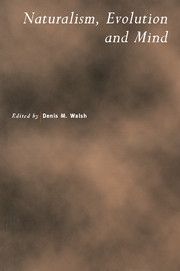Book contents
- Frontmatter
- Contents
- preface
- Notes on Contributors
- Editor's Introduction
- Mind the Adaptation
- Should Intentionality be Naturalized?
- Norms, History and the Mental
- What has Natural Information to do with Intentional Representation?
- Locke-ing onto Content
- The Evolution of Means-End Reasoning
- Rationality and Higher-Order Intentionality
- Theory of Mind in Non-Verbal Apes: conceptual issues and the critical experiments
- The Principle of Conservatism in Cognitive Ethology
- Domains, Brains and Evolution
- Evolution and the Human Mind: how far can we go?
- Index
Norms, History and the Mental
Published online by Cambridge University Press: 10 May 2010
- Frontmatter
- Contents
- preface
- Notes on Contributors
- Editor's Introduction
- Mind the Adaptation
- Should Intentionality be Naturalized?
- Norms, History and the Mental
- What has Natural Information to do with Intentional Representation?
- Locke-ing onto Content
- The Evolution of Means-End Reasoning
- Rationality and Higher-Order Intentionality
- Theory of Mind in Non-Verbal Apes: conceptual issues and the critical experiments
- The Principle of Conservatism in Cognitive Ethology
- Domains, Brains and Evolution
- Evolution and the Human Mind: how far can we go?
- Index
Summary
Many people think the mind evolved. Some of them think it had to evolve. They think the mind not only has a history, but a history essential to its very existence.
Of those who think it had to evolve, some think it because they discern, or think they discern, a normative quality to mental affairs, a way mental states and activities {qua mental) are supposed to be, that can only be understood by conceiving of mentality as a product of an evolutionary process. Without a process like natural selection (or learning), processes capable of grounding a difference between how things are and how they are supposed to be, there is nothing to provide the requisite contrast with existing fact, the sort of contrast implied by speaking (as we do in cognitive affairs) of beliefs, perceptions, and inferences as correct or incorrect, mistaken or fallacious, right and wrong, veridical and illusory. If this normative quality is really essential to cognitive affairs, and history is the only source of normativity, then history is to minds what it is to fossils. Without the right history, there aren't any.
Since the arguments for this view are not entirely convincing—even to someone like me who accepts their conclusion—and the consequences of the view, I keep being told, are preposterous, I take this occasion to re-examine the matter. If I am to continue believing not just that the mind is a product of historical development, but, like a fossil, can only exist in that way, I need better reasons than I've already got.
- Type
- Chapter
- Information
- Naturalism, Evolution and Mind , pp. 87 - 104Publisher: Cambridge University PressPrint publication year: 2001
- 1
- Cited by

